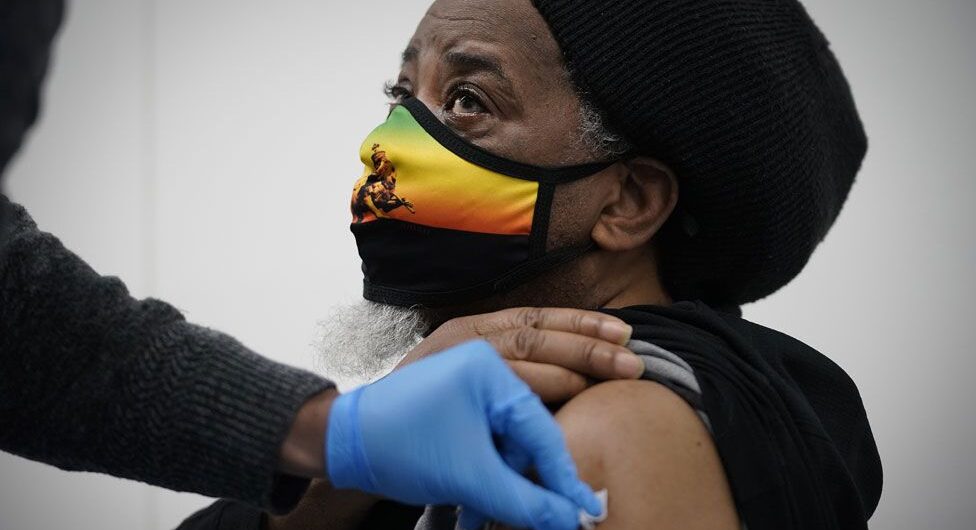Results that show the Oxford-AstraZeneca vaccine may reduce the spread of coronavirus have been hailed as “absolutely superb” by the health secretary, according to the BBC.
Matt Hancock said the study shows “vaccines are the way out of this pandemic”.
It is the first time a vaccine has been shown to reduce transmission of the virus.
The UK has given a first Covid jab to 9.6 million people so far. The results of the study, which has not yet been formally published, suggest that the vaccine may have a “substantial” effect on transmission of the virus.
It means the jab could have a greater impact on the pandemic, as each person who is vaccinated will indirectly protect other people too.
Mr Hancock called the study “really encouraging” on Twitter, adding that the results were “absolutely superb”.
Speaking on BBC Breakfast, he said this latest analysis showing the vaccine reduces transmission would “help us all get out of this pandemic”.
The study by the University of Oxford, where the vaccine was developed, measured the impact on transmission by testing for asymptomatic infections, swabbing participants every week in addition to recording when anyone fell ill with Covid-19.
As well as showing an effect on transmission, the study found the vaccine offered 76% effective protection from a single dose for three months.
With no fall in protection during the three-month period, the researchers said the results supported gaps between first and second doses of between four and 12 weeks.
The effectiveness of the vaccine increased with a longer gap of 12 weeks before the booster jab.
When the second dose is given, the study found the level of protection from the Oxford-AstraZeneca vaccine rises to 82%.
In other developments:
- One of the world’s largest follow-up Covid studies found almost 90% of people who tested positive for Covid had protective antibodies against the virus six months after their initial infection
- The number of people with coronavirus has changed little in the week to 23 January, the Office for National Statistics says, with virus levels still high in England (one in 55) and level in Scotland (one in 110), Wales (one in 70) and Northern Ireland (one in 50)
The new analysis of the Oxford vaccine suggests that transmission of the virus from those who have been vaccinated could be substantially reduced.
If verified by the scientific review process, it means that as more people get the jab, infection levels could come down faster than they would otherwise and enable the government to lift restrictions sooner than they could otherwise.
One in six of the population has had at least one jab so far. There’s still a long way to go but the impact on case numbers could begin to be felt in the coming weeks.
The fly in the ointment though is the recent emergence in the UK of variants that may be more resistant to some vaccines.
Experts believe that jabs will still offer good protection especially against severe illness, but even so this could slow progress.
The race is now on to vaccinate as many people as quickly as possible, in order to keep a step ahead of the variants. The government is also trying to slow the spread of variants through enhanced surveillance and testing.
But a critical part of the strategy is to drive down infection levels, so people don’t catch the virus in the first place, whatever variant it might be.
In France, use of the Oxford vaccine has been restricted by health authorities who say it should only be given to people under 65.
Mr Hancock, the UK health secretary, said scientists had looked directly at the over-65s and there was “a high degree of confidence” that the Oxford vaccine worked on people of all ages.
He added that the latest research showed the world the vaccine works – “it works well” and “categorically supports” the government’s strategy.
Asked if it could now mean children in England returning to school before 8 March, he pointed out 30,000 people were still in hospital.
“We’ve got to get this right down,” he told the Today programme.
“It’s too soon to be able to take action in England and we’ve set out the timescale because we think that’s when we should be able to take action, if all goes well.”
Alongside the Oxford vaccine, the Pfizer/BioNTech vaccine is also being rolled out across the UK.
Clinical trials of the Pfizer vaccine and Moderna, which has been approved but is not yet in use, did not look for a potential impact on transmission.
However, BBC health correspondent James Gallagher said the different vaccines all target the same part of the virus so if one can cut transmission, there is a good chance the others can too.
Image: Getty Images




